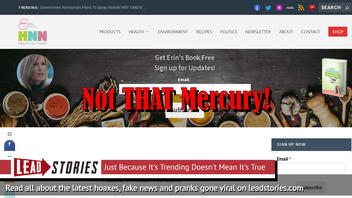
Do flu vaccines contain 25,000 times more mercury than is legally allowed in drinking water? No, that's not true: Some flu vaccines do contain a trace amount of the organic compound Thimerosal, whch is 50-percent mercury. Thimerosal, used as a preservative only in multi-dose vials, breaks down in the body as ethyl mercury, which is removed from the body and does not bioaccumulate. It is considered safe in small doses by the World Health Organization. The form of mercury found in fish and water is methyl mercury and it accumulates in human tissue. It is considered hazardous even in small amounts. The testing that purportedly found "25,000 times more mercury" in the vaccine was done by an anti-vaccine crusader and not an independent accredited laboratory.
The story originated from an article (archived here) where it was published by HealthNutNews.com on October 8, 2016, under the title "Flu vaccine contains 25,000 times more mercury than is legally allowed in drinking water". It opened:
In case you missed it, recent lab tests conducted at the Natural News Forensic Food Lab found that seasonal flu vaccines, which are pushed on virtually everyone these days, including young babies, pregnant women and the elderly, contain outrageously high levels of neurotoxic mercury. Vials of batch flu vaccine produced by British pharmaceutical giant GlaxoSmithKline (GSK) were found to contain upwards of 51 parts per million of mercury, or 25,000 times the legal maximum for drinking water established by the Environmental Protection Agency (EPA).
This is what social media users saw:
The false claim misleads readers by conflating the "safe in small amounts" ethyl mercury with the "harzardous even in small amounts" methyl mercury. The differences between the two mercuries is explained in a paper abstract titled "Toxicity of ethylmercury (and Thimerosal): a comparison with methylmercury" posted on the website of the National Institutes of Health:
Ethylmercury (etHg) is derived from the metabolism of thimerosal (o-carboxyphenyl-thio-ethyl-sodium salt), which is the most widely used form of organic mercury. Because of its application as a vaccine preservative, almost every human and animal (domestic and farmed) that has been immunized with thimerosal-containing vaccines has been exposed to etHg. Although methylmercury (meHg) is considered a hazardous substance that is to be avoided even at small levels when consumed in foods such as seafood and rice (in Asia), the World Health Organization considers small doses of thimerosal safe regardless of multiple/repetitive exposures to vaccines that are predominantly taken during pregnancy or infancy.
The U.S. Food and Drug Administration also said:
Thimerosal, which is approximately 50% mercury by weight, has been one of the most widely used preservatives in vaccines. It is metabolized or degraded to ethylmercury and thiosalicylate. Ethylmercury is an organomercurial that should be distinguished from methylmercury, a related substance that has been the focus of considerable study. Methylmercury is the type of mercury found in certain kinds of fish. At high exposure levels methylmercury can be toxic to people. In the United States, federal guidelines keep as much methylmercury as possible out of the environment and food, but over a lifetime, everyone is exposed to some methylmercury.
The National Centers for Disease Control (CDC) also explains the difference on its webpage titled Thimerosal in Vaccines:
Mercury is a naturally occurring element found in the earth's crust, air, soil, and water. Two types of mercury to which people may be exposed -- methylmercury and ethylmercury -- are very different.
Methylmercury is the type of mercury found in certain kinds of fish. At high exposure levels methylmercury can be toxic to people. In the United States, federal guidelines keep as much methylmercury as possible out of the environment and food, but over a lifetime, everyone is exposed to some methylmercury.
Thimerosal contains ethylmercury, which is cleared from the human body more quickly than methylmercury, and is therefore less likely to cause any harm.
It is misleading for HealthNutNews.com to compare the mercury levels in flu vaccines to mercury levels in water. It could also be dangerous if it causes someone to not get an influenza vaccination because of the misinformation.
Another problem with the story is that only a certain type of flu vaccine has ther mercury compound. The same CDC page explains it is not used in the nasal spray form or in the single-dose vials, since a preservated is unnecessary:
Thimerosal is added to vials of vaccine that contain more than one dose (multi-dose vials) to prevent growth of germs, like bacteria and fungi. Introduction of bacteria and fungi has the potential to occur when a syringe needle enters a vial as a vaccine is being prepared for administration. Contamination by germs in a vaccine could cause severe local reactions, serious illness or death. In some vaccines, preservatives, including thimerosal, are added during the manufacturing process to prevent germ growth.
The CDC also said scientific research does not show a connection between thimerosal and autism.
Research does not show any link between thimerosal in vaccines and autism, a neurodevelopmental disorder. Many well conducted studies have concluded that thimerosal in vaccines does not contribute to the development of autism. Even after thimerosal was removed from almost all childhood vaccines, autism rates continued to increase, which is the opposite of what would be expected if thimerosal caused autism.
The suspicion that thimerosal in childhood vaccines for measles, mumps and rubella could be linked to autism is unfounded, the CDC said:
Measles, mumps, and rubella (MMR) vaccines do not and never did contain thimerosal. Varicella (chickenpox), inactivated polio (IPV), and pneumococcal conjugate vaccines have also never contained thimerosal.
Influenza (flu) vaccines are currently available in both thimerosal-containing (for multi-dose vaccine vials) and thimerosal-free versions.
NewsGuard, a company that uses trained journalist to rank the reliability of websites, describes healthnutnews.com as:
A site dedicated to alternative medicine that originated a false conspiracy theory about the deaths of holistic doctors.
According to NewsGuard the site does not maintain basic standards of accuracy and accountability. Read their full assessment here.
We wrote about healthnutnews.com before, here are our most recent articles that mention the site:
















